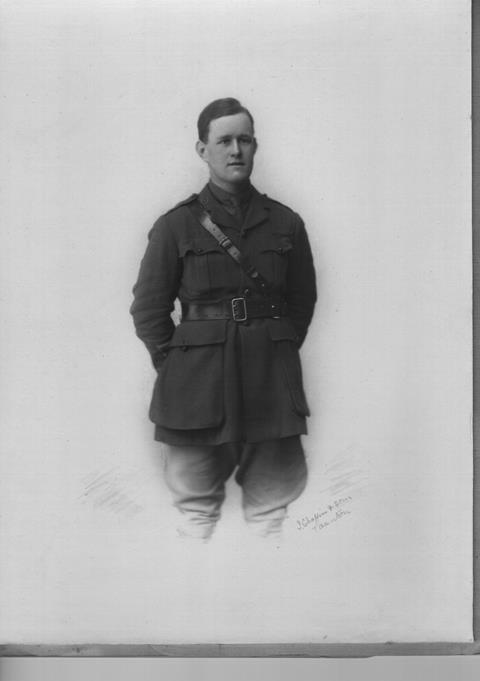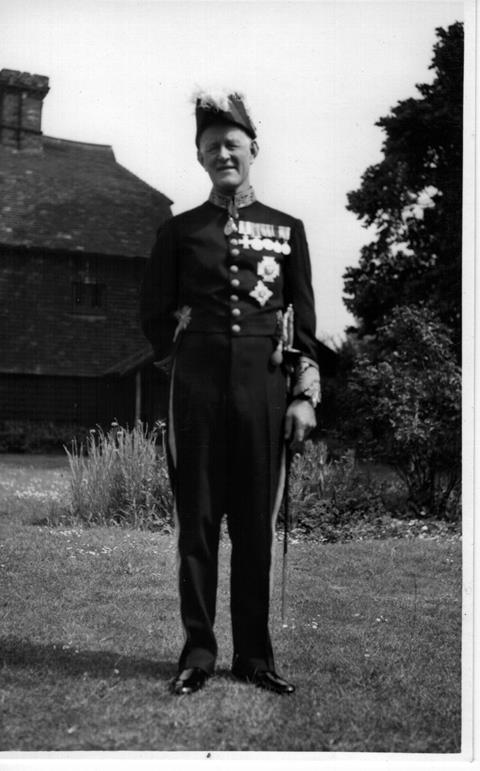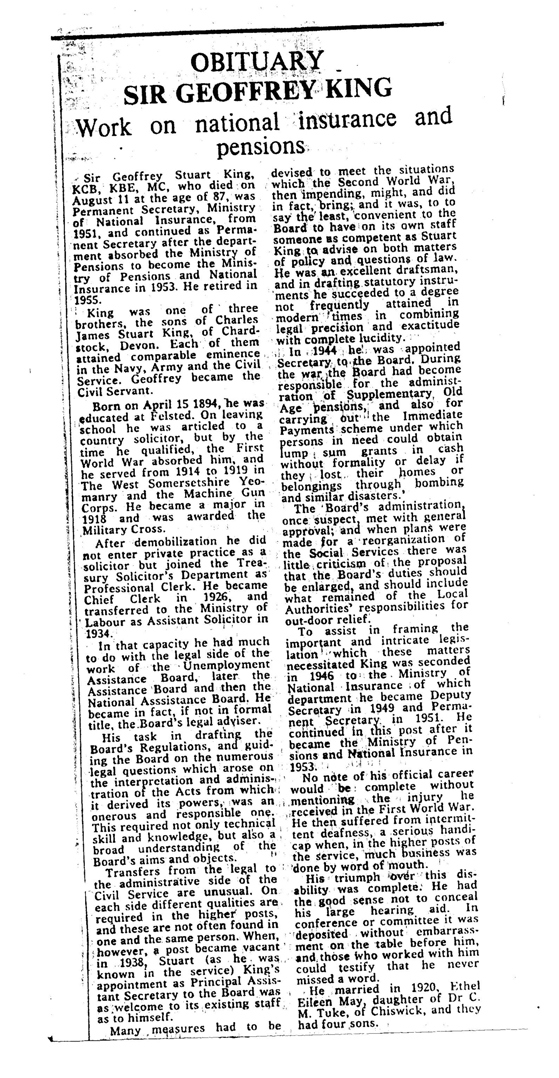
The summer of 1914 remains fresh in my memory. It was a glorious summer with seemingly endless days of sunshine. If there was any talk of war we felt it did not concern us.
I had left school when I was sixteen and a half and that was the end of my formal education. Shortly before my seventeenth birthday I became articled, or apprenticed, to a solicitor in the neighbouring town of Chard, Somerset. It was a seven mile walk there and back over the fields each day. I left home at about 8.30 and got back about 6: as I could not afford a proper lunch I felt a bit peckish by the time I got home. An articled clerk had to serve for 12 months before taking the Law Society's intermediate examination. Most clerks waited longer as there was a lot of ground to cover, including accounts as well as law. I was however anxious to get the examination out of the way and sat for it at the earliest opportunity. I passed with First Class Honours; one of three in a field of several hundreds.
When war broke out the family view was that two sons out of one family [in the services] was enough and that I should remain at home to carry on ‘business as usual’, in the catch phrase of the moment. So for a month or so I continued to walk back and forth to the office in Chard.
It was no use… as soon as I got an assurance from the Law Society that time spent on the Armed Forces would be allowed to count as time spent under articles - it is strange how important that seemed at the time - I enlisted as a trooper on the West Somerset Yeomanry
The early days of the war was pretty tough. We were billeted on a farm in East Essex and shared the cowshed with the cows. I was soon selected for a commission and sent down to Taunton to help form a second line regiment.
As an officer I had, for the first time in my life, money to spend and so long as I remained in England life was very pleasant.
I was seconded to the Machine Gun Corps and had my first experience of the front line in France in 1917. Life during the period of static warfare was noisy and messy but on the whole not too bad. When mobile warfare began in 1918 with big retreats things were very different.
We were being pushed steadily back by the Germans north of Hazebrouck. By this time I was in charge on a company of 16 machine guns. Most of my company were lost but I had managed to keep two guns under my immediate control. We went into a deserted estaminet and I put one gun upstairs firing through a bedroom window and the other on the ground floor. I had no idea what the next move was to be when suddenly a runner appeared with a written order from the brigadier to retire. How the brigadier spotted me and how the runner got through I shall never know but we got out just in time but not before my sergeant had shot two Germans at point blank range with his revolver.
There were some lighter moments. During trench warfare the powers that be used to enjoy what were called Chinese attacks. No-one actually moved out of their trenches but everyone blazed off with every available weapon. When one such event was being planned I was told that the brigadier wanted the machine guns to take a more active part. It would have been madness to fire from battle stations for a stunt like this as it would have given them away.

I therefore moved a few guns to a site in the open and told the men to keep their fingers on the firing buttons. I heard afterwards that by some extraordinary chance the site I had chosen was directly behind the spot where the brigadier had gone to watch the show and that, not knowing how high above the ground the stream of my bullets was flying, he had spent the time flat on his stomach. He was quite nice about it but I had no more complaints about machine guns.
An occasion of a very different sort was when I deliberately disobeyed written orders and found myself in a position of not knowing whether I was to be awarded a DSO or a court martial. It happened when the battalion in the line was going to make an attack at full strength to capture a strong point in the enemy line which had been causing a lot of trouble. Divisional HQ, where my orders came from, was several miles behind the line as we had been advancing and when I saw the detailed orders I realised that they had been written by someone who had never been near the scene of the attack. They were nonsense and might have had serious consequences if the enemy counter attacked as all my guns would have been out of action. I therefore went and talked things over with the commander of the battalion which was to do the attack and worked out an alternative plan. The attack was a complete success largely, according to prisoners, because their reserves intended for a counter attack had been wiped out by machine gun fire.
Fine! But for the fact that according to my orders there never should have been any machine gun fire at that spot. I lay low and said nothing and it was not until after the war was over that the unit was told. This necessity to think things out for myself instead of slavishly following orders was a feature of a machine gun company¹s life and it happened to me more than once.
And so to my last battle. The assault line lay between two Belgian villages whose names have always been fixed in my mind. Ooteghem and Ingoygham. In the centre was a large windmill. The Germans occupied a strong position on a hill opposite and it was expected that it would be a tough business to turn them out. Preparations on our side were formidable; guns were parked in the open, wheel to wheel. I had been detailed to give close support to the attacking troops. The first phase involved setting up a machine gun barrage from my 16 guns to cover the advance and the first step was to choose a site for the guns. I paid several visits to the front line and eventually decided to take a risk by putting them in a trench between the two lines in front of the windmill. During the afternoon before the advance was to start the men moved up to a position behind the windmill and I arranged to join them later as I had several other things to see to. About midnight I started off on my two mile walk up to where the men were. I was tired and worn out and stupidly I had arranged to go up alone.
I shall never forget my feelings during that walk. The night was quiet enough but at last I understood the state of mind of some of the men I had defended before courts martial on charges of desertion. It seemed so much more sensible to walk the other way and get away from it all; but I got there in the end. We got the guns into position in the grey light of early dawn without incident and sat down to wait for the big fellows to open up which would be the signal for us to start firing. It came at last and I gave the order to open fire. To my horror I saw that one gun team had loaded with tracer bullets which were used for firing at aircraft and in the semi darkness sent a stream of light into the night.
Our carefully chosen position was exposed and I feared the worst. There was nothing I could do but await the inevitable counter battery work which would wipe us out. It never came, either the traces had not been spotted or, more likely, our big guns had made effective counter battery work impossible.
The assault went forward as planned and after a few hours I moved my company forward to give the infantry further support. It was a somewhat messy affair but we came through without any casualties. It was for this engagement I got my MC.
The armistice followed soon after and bought an entirely new range of problems. As a student I was in an early category for demobilisation and I was glad when my turn came in February 1919. My last job was as officer in command of troops on board a troopship from Calais to Southampton and my last crisis was when all the men rushed to one side of the ship when the harbour came in view and nearly caused us to capsize. A few days later I was ‘disembodied’, to use the elegant phrase applicable to territorials, and with a few hundred pounds in the bank by way of gratuity I had to get down to some hard thinking on what should be my next move.
I had grown up a lot during the war. I had gained confidence in my ability to cope with events and had learned to back my own judgement. If I could rise from a trooper in the Yeomanry to major in command of a machine gun company I felt that I could do as much in other fields: and if my rise was due to luck, and to a large extent it was, I felt sure that luck would be on my side in civilian life too.
It was [my future wife’s] family solicitor who told me about vacancies in the Treasury Solicitors’ Department and I decided to apply. I sat down and wrote an application but after sleeping on it I decided to go to London and try and get an interview instead. I was successful and from what I learnt later about the way applications were handled, I realise that had I posted the written application I would never have got the job. I started work at the Treasury at a salary which, though modest, was enough to pay for board and lodging in London. I can still recall the thrill of arriving at the Treasury for the first time as a member of the staff.
In the special circumstances of the post war period I had been taken on before being fully qualified but it was understood that I would be expected to take my final examination as soon as possible. I learned that the Law Society were to put on what we were told would be a fairly easy examination to enable people like myself who had spent several years in the forces to qualify quickly. It was tempting, but I had always set my heart on attaining a good honours standard so I decided to wait until more normal examinations were resumed. It paid off, and in the autumn of 1919 I passed second class honours and was also awarded a prize of books to the value of £60, which bought a lot of books in those days.
Footnote: Geoffrey Stuart King joined the Treasury Solicitor's department in a career which included working on the drawing up of a constitution for Rhodesia, the partition of Ireland, privatising the Anglo Persian Oil Company and the Cable and Wireless companies, authorization of grants for the development of Canada, and preparation of Acts of Dominion for India, Canada, South Africa, and Burma. It took him to a role as permanent secretary at the Ministry of National Insurance, and to Chairmanship of the Commission of Enquiry into the Organization and Cost of the Public Service of Trinidad and Tobago prior to independence. He was awarded both a KCB and KBE.
We would like to thank his grand-daughter, barrister Emma Stuart King of 1 Pump Court, for these memoirs. His great-grand-daughter, Jemima Grimshaw has completed the LPC and is currently seeking a training contract.




No comments yet